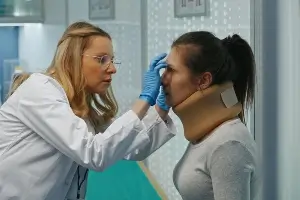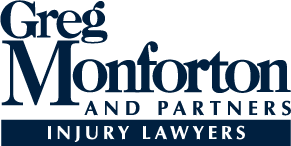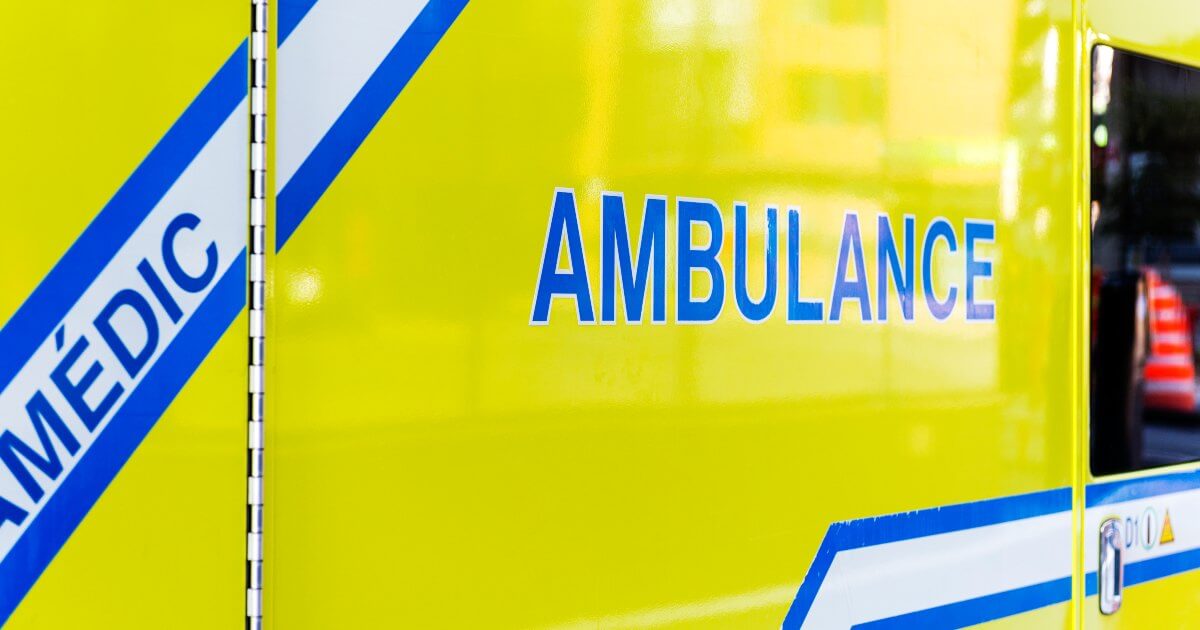 Car accidents cause broken bones, spinal injuries, lacerations, and concussions in seconds. While these injuries have severe consequences, some crash victims may also experience vision loss, a less talked about, but devastating injury.
Car accidents cause broken bones, spinal injuries, lacerations, and concussions in seconds. While these injuries have severe consequences, some crash victims may also experience vision loss, a less talked about, but devastating injury.
At Greg Monforton & Partners, we are prepared to help you seek the compensation you deserve after a car crash that damages your vision or causes other injuries. Our car accident lawyers in Windsor are highly qualfied and prepared to work tirelessly on your behalf to hold the at-fault parties accountable for their negligence.
Need legal help after a Windsor crash? Call: (866) 320-4770 for your free case review today.
How Can a Car Accident Damage My Vision?
A collision creates a force strong enough to damage your vision. Eye injuries or other direct trauma to the brain and surrounding structures can cause visible harm, along with vision loss. Flying glass, deployed airbags, impact with the steering wheel, or even the violent forward-backward motion can also cause immediate damage to delicate eye tissues or the optic nerve. These injuries may result in symptoms ranging from blurred vision and light sensitivity to double vision or complete sight loss.
Head trauma during a crash may also damage the visual cortex or other brain regions responsible for processing visual information. Even when the eyes themselves remain physically intact, the brain’s ability to interpret visual signals can become impaired. This type of vision damage, called cortical visual impairment, presents unique challenges as the injury is not to the eye itself but to the neurological system that processes what we see.
What Common Types of Car Accident Injuries Lead to Vision Loss?
Several specific injuries from car accidents can directly impact vision, either temporarily or permanently. These injuries require prompt medical attention as delays in treatment may worsen the long-term prognosis for vision recovery.
Corneal Abrasions
Scratches on the cornea from debris or impact can cause pain, blurred vision, and increased sensitivity to light.
Whiplash-Related Vision Problems
Whiplash injuries are very common in car crashes and are caused by the rapid back-and-forth movement of the head. While you may be aware that it can damage the cervical spine and affect blood flow to the brain, you may not know that it can also affect your vision. The violent motion can potentially disrupt visual processing, causing symptoms like blurred vision, visual tracking difficulties, and light sensitivity.
Orbital Fractures
Broken bones surrounding the eye socket can damage eye muscles, nerves, and blood vessels, affecting eye movement and vision.
Traumatic Brain Injury
Damage to the visual cortex or other brain regions involved in sight processing can result in various vision disturbances despite the eyes being physically unharmed.
Vitreous Hemorrhage
Bleeding within the eye’s gel-like interior can block light from reaching the retina and cause vision impairment.
Foreign Body Penetration
Shattered glass or metal fragments can penetrate the eye during a collision, causing serious damage to internal eye structures.
Retinal Detachment
The impact force can tear or detach the retina from the back of the eye. This injury can result in permanent vision loss without immediate surgery to repair the damage. Initial symptoms of retinal detachment may include:
- Floaters in the eyes
- Flashes of light in one or both eyes
- A curtain-like shadow or areas of darkness appearing in your peripheral vision
- Straight lines that suddenly appear curved
- Blurred vision
Traumatic Optic Neuropathy
Damage to the optic nerve from blunt force trauma can disrupt the transmission of visual information from the eye to the brain.
What Should I Do If My Vision Changes After a Car Accident?
Any change to your vision following a car accident should be treated as a medical emergency requiring immediate attention. Be sure to let emergency room doctors know about your vision changes and that you were involved in a car crash.
Vision changes might appear immediately after the crash or develop hours or even days later. Delaying treatment for serious eye injuries such as retinal tears or detachments can lead to permanent vision loss that might have been prevented with prompt care.
Seek Emergency Medical Care
Visit the nearest A&E department immediately if you experience any vision changes, flashes of light, floating spots, or a “curtain” coming across your vision. These could indicate a retinal detachment requiring urgent specialist intervention.
Request an Ophthalmology Consultation
If in the A&E, ask specifically to be seen by or referred to an ophthalmologist if you have any vision symptoms, as general emergency physicians may not have specialized equipment to fully assess eye injuries.
What Is the Long-Term Impact of Vision Loss After a Crash?
For minor or temporary vision impairment, there may be no long-term impact. If the vision loss is permanent, however, the consequences extend far beyond the initial damage.
Long-term impacts of permanent vision loss after a car crash may include:
- Employment Difficulties: Victims may experience significant career challenges, including job loss, reduced work hours, or the need to change professions entirely.
- Loss of Independence: Victims may be unable to drive, read, recognize faces, or navigate unfamiliar environments safely, greatly reducing their independence.
- Substantial Financial Burden: The lifetime costs for vision impairment include ongoing medical care, assistive technology, and potential lost income, creating a significant financial impact.
- Extensive Medical Treatment: Ongoing care typically includes specialist appointments, possible surgeries, vision therapy, and various assistive devices.
- Mental Health Challenges: Vision loss frequently leads to psychological impacts including adjusting to new limitations, changes in self-perception, and social challenges.
- Home Modifications: Residential adaptations may be necessary to accommodate changing vision needs and maintain safety at home.
- Relationship Changes: Vision loss can alter family dynamics as roles and responsibilities shift to accommodate new needs and limitations.
What Compensation Will Help Cover My Vision Loss Emergency Care and Ongoing Treatments?
After a car accident in Ontario that causes vision loss, you may be eligible for several types of compensation to cover both immediate and long-term care needs. Understanding these potential sources of financial support is crucial for ensuring your treatment needs are fully addressed.
- OHIP Coverage: Ontario Health Insurance Plan covers emergency care, medically necessary eye examinations by ophthalmologists, and certain eye surgeries.
- Statutory Accident Benefits: Your primary auto insurance coverage for medical expenses regardless of fault, including vision specialist visits, surgeries, and some therapy.
- Medical Rehabilitation Benefits: Funds specifically for recovery treatments, including vision therapy and rehabilitation services.
- Attendant Care Benefits: Coverage for personal care assistance if vision loss affects your ability to care for yourself.
- Income Replacement Benefits: Financial support if your vision loss prevents you from working.
- Out-of-Pocket Expenses: Reimbursement for vision-related costs like prescription eyewear, transportation to medical appointments, and home modifications.
- Tort Claim Damages: Compensation from the at-fault driver’s insurance for medical expenses beyond what OHIP and your own insurance cover.
- Future Care Costs: Compensation for anticipated long-term vision treatments, medications, and assistive devices.
- Loss of Enjoyment of Life: Compensation for how vision impairment has affected your quality of life and ability to participate in former activities.
What Evidence Can Help to Prove Vision Loss in a Personal Injury Claim?
You will need substantial medical documentation and expert testimony to establish the extent of your vision impairment and its direct connection to the car accident that caused it.
Insurance companies often challenge vision-related claims, making strong evidence crucial for securing fair compensation.
- Medical Records: Complete documentation from emergency care through all specialist visits.
- Diagnostic Tests: Visual field tests, retinal imaging, and other objective measurements.
- Specialist Reports: Detailed assessments from ophthalmologists and vision specialists.
- Previous Eye Exams: Records establishing your vision condition before the accident.
- Impact Journal: Documentation of how vision changes affect your daily life.
- Witness Statements: Testimonies about observable changes in your functioning.
- Employment Records: Evidence of work disruptions caused by vision impairment.
- Expert Testimony: Qualified medical experts who can explain your injuries to the court.
Suffering Vision Loss After a Car Accident? Contact Greg Monforton and Partners
Recovering from vision loss takes time, patience and the right support. Early treatment, thorough medical care and experienced legal help give you the best chance for the best possible outcome.
At Greg Monforton & Partners, we are dedicated to helping victims of personal injuries, and we are here to provide the guidance and resources necessary for your recovery. Contact us today for a free consultation and let us help you pursue the compensation you deserve. Worried about cost? There are no out-of-pocket fees or costs to pay up front.
Call Our trusted Windsor law firm today to request a free case review: (866) 320-4770




